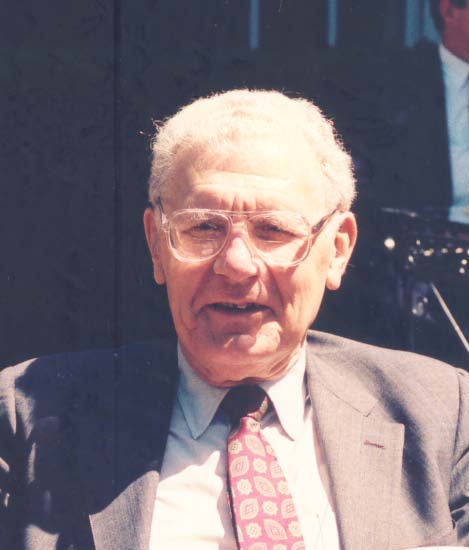Creating the Corporate Future: Plan or Be Planned for
Frases célebres de Russell L. Ackoff
Creating the Corporate Future: Plan or Be Planned for
Creating the Corporate Future: Plan or Be Planned for
Russell L. Ackoff: Frases en inglés
Preface, cited in Gharajedaghi, Jamshid. Systems thinking: Managing chaos and complexity: A platform for designing business architecture http://booksite.elsevier.com/samplechapters/9780123859150/Front_Matter.pdf. Elsevier, 2011. p. xiii
Towards a Systems Theory of Organization, 1985
Fuente: 1990s, Re-Creating the Corporation (1999), p. 83.
Fuente: 1950s, The development of operations research as a science, 1956, p. 270.
This [understanding of why systems work] requires synthetic thinking... Analysis is the way scientists conduct research. Synthetic thinking is exemplified by design.
Ackoff & Greenberg (2008) Turning Learning Right Side Up. p. 61 as cited in: Stephen M Millett (2011) Managing the Future: A Guide to Forecasting and Strategic Planning. p. 52.
2000s
With the participation of a number of other graduate students in philosophy and a few other members of the faculty we started this institute on a completely informal basis.
Preface, cited in Gharajedaghi, Jamshid. Systems thinking: Managing chaos and complexity: A platform for designing business architecture http://booksite.elsevier.com/samplechapters/9780123859150/Front_Matter.pdf. Elsevier, 2011. p. xii
Towards a Systems Theory of Organization, 1985
Fuente: 1960s, A concept of corporate planning, 1969, p. 1 as cited in: George David Hughes (1997) Marketing management: a planning approach. p. 14 and many other works.
Cited in Donella Meadows (2008) Thinking in Systems: a Primer. p. 1.
1970s, The future of operational research is past, 1979
Fuente: 1970s, On purposeful systems., 1972, p. 39, as cited in: Jacob Hendrik Galjaard (2009) De droom van mijnheer Ariyoshi. p. 89:
Fuente: 1950s, The development of operations research as a science, 1956, p. 265, the lead paragraph ; Cited in: Joe Kelly (1969) Organizational behaviour. p. 26.
Fuente: 1960s, Scientific method: optimizing applied research decisions, 1962, p. 1.
Partly cited in: Jean-Marc Choukroun, Roberta Snow (1992) Planning for human systems: essays in honor of Russell L. Ackoff. p. 287.
1950s, The development of operations research as a science, 1956
Fuente: 1960s, Management misinformation systems, 1967, p. 149.
Fuente: 2000s, A little book of f-laws: 13 common sins of management, 2006, p. 2 cited in: Gregory H. Watson (2010) "By rejecting the status quo, Russ Ackoff took systems thinking to greater heights" in: QP. vol 27, March 2010, p. 30.
Ackoff (2006) A little book of f-laws: 13 common sins of management. p. 12.
2000s
Fuente: 1970s, Redesigning the future, 1974, p. 14.
Cited in: Can Alpaslan, Ian Mitroff (2011) Swans, Swine, and Swindlers: Coping with the Growing Threat of Mega-Crises and Mega-Messes. p. 16.
1970s, The future of operational research is past, 1979
Fuente: 1960s, Scientific method: optimizing applied research decisions, 1962, p. 108 as cited in: Charles West Churchman, Richard O. Mason (1976) World modeling: a dialogue. p. 23.
Fuente: 1980s, Creating the Corporate Future, 1981, p. 15-16.
Fuente: 1990s, Re-Creating the Corporation (1999), p. 289.
“When a business is bought, it is bought for its potential—for its future, not its past.”
Fuente: 1990s, Re-Creating the Corporation (1999), p. 133.
Fuente: 1990s, Re-Creating the Corporation (1999), p. 4.
Fuente: 1970s, Redesigning the future, 1974, p. 14.
Preface, cited in Gharajedaghi, Jamshid. Systems thinking: Managing chaos and complexity: A platform for designing business architecture http://booksite.elsevier.com/samplechapters/9780123859150/Front_Matter.pdf. Elsevier, 2011. p. xiii
Towards a Systems Theory of Organization, 1985
As cited in: Journal of systems management. Vol. 25, p. 39. Association for Systems Management, 1974.
1970s, Towards a System of Systems Concepts, 1971
Fuente: 1990s, Re-Creating the Corporation (1999), p. 253.
Fuente: 1980s, Creating the Corporate Future, 1981, p. 224-225 as cited in: David Ing (2010) "The producer-product relation, and coproducers in systems theory". in the Coevolving blog, September 02, 2010.
“Managers cannot learn from doing things right, only from doing them wrong”
Fuente: 2000s, A little book of f-laws: 13 common sins of management, 2006, p. 37 cited in: Andrew Carey (2008) Inside Project Red Stripe: Incubating Innovation and Teamwork at the Economist. p. 49.
Fuente: 1960s, Management misinformation systems, 1967, p. 148.
Fuente: 1960s, A concept of corporate planning, 1969, p. 1 as cited in: Henry Mintzberg (1994) Rise and Fall of Strategic Planning. p. 98.
